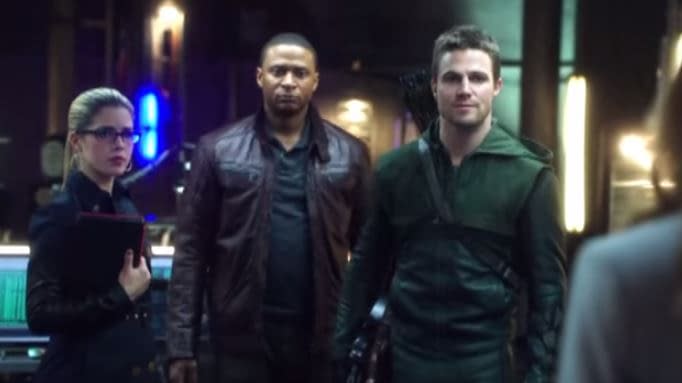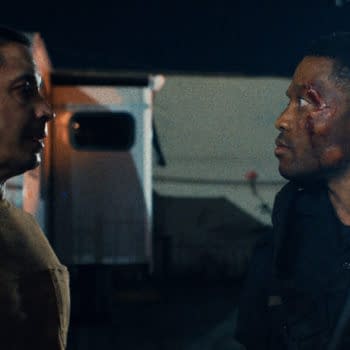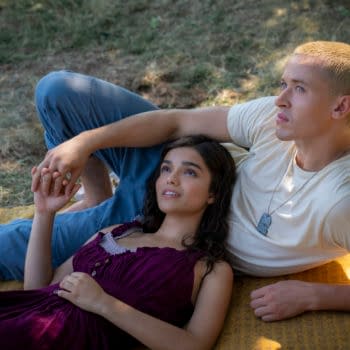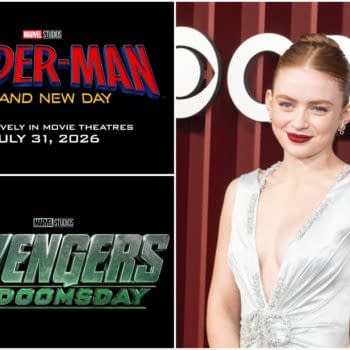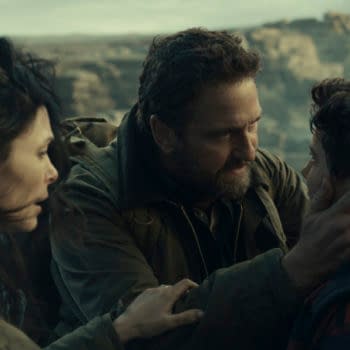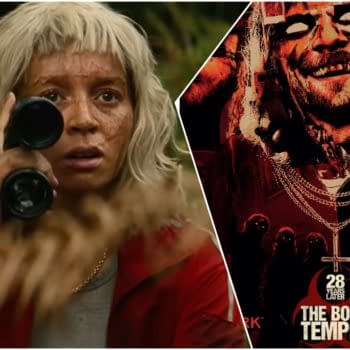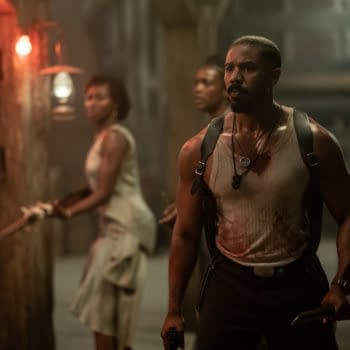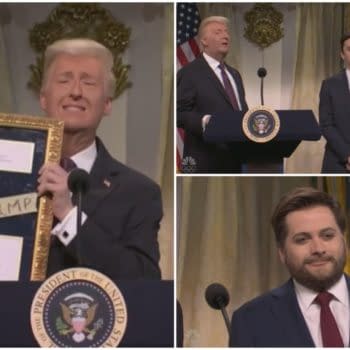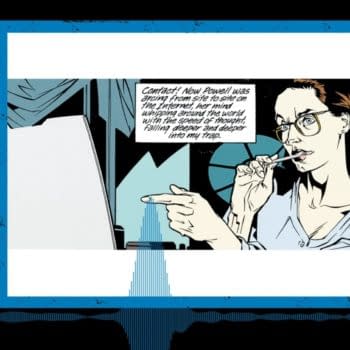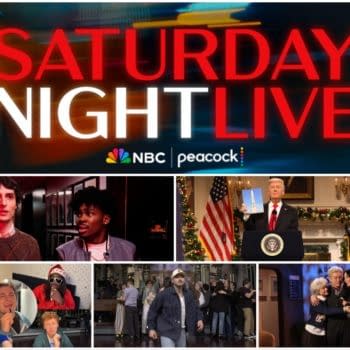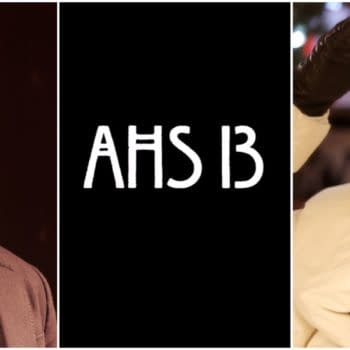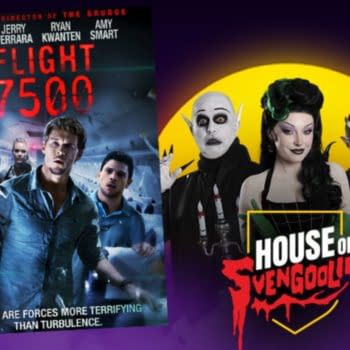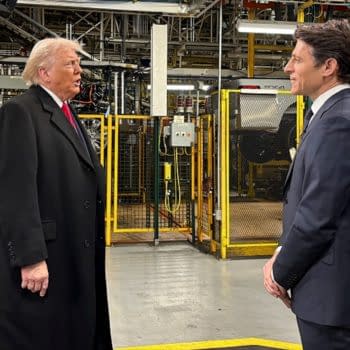Posted in: Movies, TV | Tagged: arrow, Birds of Prey, Comics, entertainment, Joseph Illidge, tv, WB
Arrow Talk With Former Birds Of Prey Editor Joe Illidge – Part Two
By Nikolai Fomich
As CW's Arrow pushes forward and enters into the third act of season three, I sat down again with Joseph Illidge – author, columnist, public speaker, and former Batman and Birds of Prey editor at DC Comics – to chat about Green Arrow, Black Canary, the Outsiders and the Demon's Head himself. You can find Part One here.
Nikolai Fomich: Of all the superheroes, Green Arrow is unquestionably the most leftwing, but we haven't seen Ollie quite develop his political or social consciousness – yet. It seems to me that Ollie's temporary demise and the resulting democratization of Team Arrow in his absence will force the character to rethink and redefine his mission and what he wants for Starling City. The team did well without him handling Brick, and it's clear they won't be blindly following his orders anymore. We've seen him lose his fortune, and now we're beginning to see him lose his unquestioned authority as leader of his team.
Do you think we're witnessing the beginnings of Ollie's transformation to a more politically conscious and democratic hero?
Joseph Illidge: I don't think Oliver Queen is interested in the political parties governing life in Starling City. He's become quite aware of their powerlessness, their impotence in the face of criminal organizations and the League of Assassins. The Mayor had zero defense against Brick, and he is less than nothing compared to the League and Ra's al Ghul. It's a parallel to what we're all confronted with about local and national government, isn't it?
If Oliver was going to really dive into politics, I could see him going independent, and in Starling City, that could give him the edge against candidates who either die, turn out to be totally corrupt like Sebastian Blood, or useless like the present Mayor.
The other way would be for Oliver to identify a person in Starling City's political structure as his ally and informant, to provide a perspective of financial flow, since the elimination of his wealth disconnected him from people of influence.
NF: Switching gears, I find it interesting that the first supervillain Laurel takes down alone is the new Vertigo, because Vertigo was in fact originally introduced as a Black Canary villain in the comics, and only later became Oliver's arch-nemesis. It's a good choice, as it demonstrates how Canary has not only stood on her own without the Arrow in the source material, but in fact provided him with his major villain.
JI: Looking at the episode "Canaries," I'd say Vertigo ultimately turns out to be Laurel's nemesis, right? He's the one who magnifies and exploits her fears, then beats the hell out of her with them.
I feel one thing Arrow did not do until that first battle with Laurel and Vertigo is to show the male victimization and invasion of women. We see women kick butt and be strong in personality and conviction, but there's the menace that women have to deal with every day. Forced male dominance, whether it's psychological, emotional, or physical.
The way I read it, those two fights Laurel had with Vertigo were not only about confronting her sister's ghost and choosing to end the foolish task of trying to fill someone else's shoes – they were about summoning the capacity for psychological and physical defense against a victimizer.
That perfectly parallels the comic book version of Black Canary. When I was editing the monthly Birds of Prey comic book for DC Comics with Black Canary, she had already overcome being tortured and dealt with the repercussions. My Black Canary was at the end of the journey Laurel is beginning, and it's sometimes tough to watch our heroes suffer before they shine.
NF: In this past season, we've seen Felicity develop beyond someone who's merely quirky and funny and has feelings for our hero. We've also seen some people begin to complain about her changing relationship with Oliver, as she is more liable to disagree and argue with him. It's something that reminds me of the online hate the character of Laurel sometimes gets. Laurel has never been the cool badass Sara was, or the quirky and funny sidekick Felicity is. Instead, we've followed her through personal loss, addiction and now an identity crisis – hers is a more complex story arc.
Do you think some viewers simply prefer their female characters to be love interests or cool additions to the hero's world, without having to see the sometimes unpleasant kind of emotional development we find in Laurel's case?
JI: Depends on the viewer, but I highly doubt any female viewer of Arrow wants to see the female heroes as the dramatic appendages to Oliver, and my guess is that the CW Network viewership is more female than male. Viewers seem to want stories about characters going through similar struggles, so in looking at Arrow, Oliver is surrounded by women. Sister, ally/love interest, ex-girlfriend/new ally. Not counting peripheral characters like Amanda Waller, Nyssa, and Tatsu Yamashiro, the (possibly) future Katana. In various ways, he knows them but doesn't understand the underlying drives that make them tick.
Men frustrate women all the time, but the men with heart could have a magnetic quality. A warmth that supersedes macho. Even if they're dense from time to time, and don't see the obvious. These are perspectives we connect with because they resonate with us, so we want our heroes to undergo the same trials we do, or else they're not worth our time. Not to say any of us are getting impaled with swords on faraway arctic mountains, but you know what I mean.
NF: Arrow is, of course, one piece of an expanding DC television universe. I've found CW's The Flash, its sister show, to be thrilling. I don't think any other superhero adaptation has managed to match the exciting and hopeful tone of Richard Donner's Superman the way The Flash has. Soon they'll be adding an animated miniseries starring Vixen to the fold, which I hear they would like to eventually lead into a live action television show. And we'll also be getting Supergirl by the same creators. What's your take on these developments?
JI: Honestly, I've been so busy on various projects I'm writing that I have not yet had time to engage The Flash, but I've heard the same good things, and that the show has a more fantastic feel and atmosphere than Arrow, which is smart.
I'm happy about the upcoming Vixen animated series. Considering that Shonda Rhimes has two well-known Black female protagonists on prime-time television, and one of them is portrayed by Viola Davis, who'll be the DC Cinematic Universe's Amanda Waller in next year's Suicide Squad film, I do wonder why Vixen couldn't just go to live-action. The presence of Black women is increasing, from Sleepy Hollow to The Walking Dead to the upcoming PlayStation Network series Powers, and granted none of those women are the single lead in their respective shows, but is it that much different than having a Black female lead in Vixen with an ethnically-diverse cast as support? I'll be watching the entire animated Vixen series, and hope it gets enough viewership to mitigate the concerns of the producers about taking the series to live-action.
The Supergirl show is an entirely different animal. I'm going to watch the pilot for sure, and take it from there. While working for DC Comics, I did get to work on the Supergirl character for a story with Nightwing, the sidekick to Batman who'll be the star of the upcoming Teen Titans show from TNT, so no matter what, I'm going to enjoy seeing those iconic characters I've worked on translated to television the way I'm enjoying seeing (Black) Canary on Arrow.
NF: You mentioned last time your love for the Outsiders. Okay, Joe – if the Arrow-verse had its own Outsiders, what would be your dream team – characters and actors?
JI: Arrgh, you're forcing me to dig deep! Okay, using what's already come in Arrow as the foundation, here's how I would do it.
In the aftermath of the battle against Ra's al Ghul and the League of Assassins, Malcolm Merlyn is killed, and leaves his fortune to Thea. Having witnessed how powerless the system is against real power, real formidability, Thea would figure out that for justice to be done, you have to operate outside the lines of acceptable behavior, sometimes to an extreme degree. That would be the Merlyn in her, right? So Thea would take her new wealth and fund her own team of operatives dealing with external threats to Starling City: The Outsiders.
Tatsu Yamashiro would become Katana, and protect Thea out of obligation to Oliver and because of their mutual connection to the League of Assassins. She would be armed with the Soultaker, the mystically-empowered sword with the spirit of her dead husband, Maseo. Because, really, do we think Maseo is going to make it out of this season alive, after deceiving Ra's al Ghul?
The nation of Markovia was shown in Arrow season two, so I would get actor Shane West (formerly of the CW show Nikita) to portray Prince Brian of Markovia and eventually become Geo-Force, his power connected to the geothermal energy of his homeland. I would pull Laurel Lance out of the Arrow crew and put The Canary with Thea's Outsiders, and have her receive combat training from Katana. I'll stop there. Those three and Thea Queen make four. Sounds like a good enough membership number for a well-funded special operations group working outside of the law, right?
NF: Sounds good to me! Finally, the last episode of Arrow episode was a game-changer, with Ra's offering Oliver the keys to the kingdom. What do you make of Ra's offer? And how do you think Oliver should respond?
JI: I think the offer Ra's made to Oliver, while mind-blowing to all of us, was sincere. Oliver has earned a special recognition in the mind of Ra's al Ghul due to his sheer tenacity, and since Oliver is the Bruce Wayne of this "universe", for most intents and purposes, the theme of the Demon's Head identifying an heir to his throne makes perfect sense.
How Oliver should respond depends upon his ultimate goal. If he wants to save his city and eliminate evil, becoming the next Ra's al Ghul makes a certain kind of large-scale sense.
Interestingly enough, back in "The Return" when Oliver put Slade Wilson back in the A.R.G.U.S. prison cell, Slade did ask the question of how much more does Oliver Queen have to lose before there is no more Oliver Queen.
Looks like we're about to find out.
Joseph P. Illidge is the co-founder of Verge Entertainment, where he is Head Writer, and a columnist at Comic Book Resources. Follow him on Twitter @JosephPIllidge
Nikolai Fomich is a writer and college teacher in Philadelphia. Follow him on Twitter @brokenquiver


